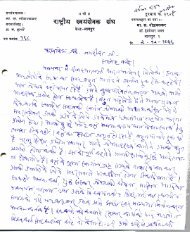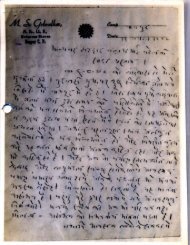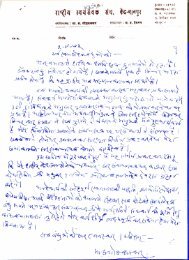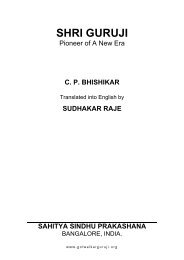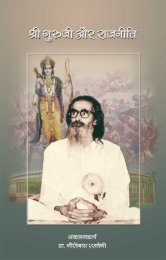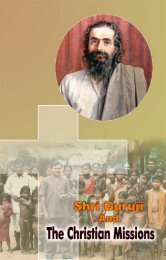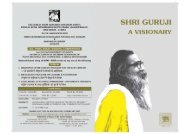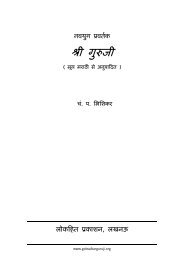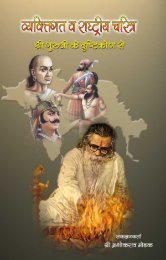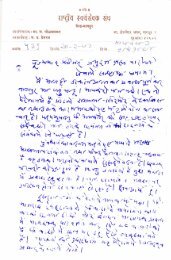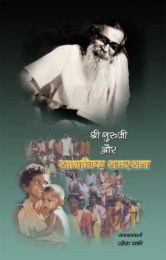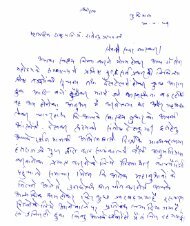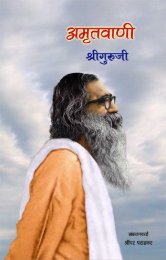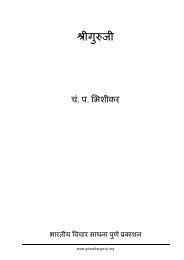Shri Guruji and Indian Muslim.pdf - Shri Golwalkar Guruji
Shri Guruji and Indian Muslim.pdf - Shri Golwalkar Guruji
Shri Guruji and Indian Muslim.pdf - Shri Golwalkar Guruji
Create successful ePaper yourself
Turn your PDF publications into a flip-book with our unique Google optimized e-Paper software.
Chapter - I<br />
New Paradigm<br />
History of Islamic aggressions <strong>and</strong> perpetual offences against indigenous culture, sects<br />
<strong>and</strong> way of life <strong>and</strong> Islamic separatism resulting into two nations theory had certainly not<br />
been primary reasons for founding of the RSS in 1925.<br />
It was born amidst hordes of Hindu organisations including All India Hindu Mahasabha<br />
led by Hindu luminaries, like V. D. Savarkar, Dr. B. S. Moonje, Bhai Parmamn<strong>and</strong>a, Dr.<br />
Shyama Prasad Mookerjee <strong>and</strong> others. Dr. Hedgewar founded the RSS with a positive note of<br />
reorganising <strong>and</strong> mentally reorienting the Hindus beyond sectarian <strong>and</strong> narrow barriers <strong>and</strong><br />
feelings, like caste, sect, creed, language <strong>and</strong> above all rabid individualism. He aimed to<br />
resurrect progressive cultural identity in purely nationalistic terms. It was, therefore, also a<br />
disapproval of the contemporary Hindu Movement obsessed with terms of reference of<br />
Islamic aggression. The stories of grave atrocities <strong>and</strong> acts of barbarism committed by<br />
Islamists for centuries are certainly useful lessons of history to correct our approach to<br />
nationalism, strengthen inner resilience of the nation <strong>and</strong> to make categorical distinctions<br />
between a national <strong>and</strong> an alien. However, the history <strong>and</strong> ideology of Islam in India cannot<br />
be the foundational elements of the Hindu movement. Dr. Hedgewar underlined the<br />
importance of creating solidarity among Hindus as a national community. This would entail a<br />
transformation in the <strong>Muslim</strong> mind <strong>and</strong> pave the way for assimilation. Thus the RSS made a<br />
clear departure from the contemporary discourse of the Hindu Movement. For Dr. Hedgewar<br />
regeneration <strong>and</strong> rekindling of nationalism was a ceaseless process just like the motion of the<br />
earth. He prevented contemporary narrow discourses to become the central issue of the RSS<br />
ideology. For instance, he differed with Dr. B. S. Moonje, Hindu Mahasabha leader, on the<br />
question of British Imperialism vis-à-vis <strong>Muslim</strong> problem (Sinha, 2003: 118-119). 2<br />
Moreover, Colonel U. N. Mookerjee 3 added an exciting issue in the contemporary<br />
discourse by his thesis that Hindus would be turned into minority <strong>and</strong> <strong>Muslim</strong>s into majority<br />
if besides demographic trend, social schism among Hindus would remain unchanged. He<br />
summed up: ‘they (<strong>Muslim</strong>s) count their number, we calculate our losses. (Mookerjee: 1909)<br />
Swami Shradhn<strong>and</strong>a’s influential work “Hindu Rashtra: Saviour of the Dying Race” came in<br />
1926. By this time the idea of demographic decline had become entrenched as a core feature<br />
of Hindu Nationalism. (Zavos: 109) Dr. Hedgewar had not used it either to explain the<br />
concept <strong>and</strong> ideology of Hindu Nation or exp<strong>and</strong> the organisation. In fact he was working on<br />
a civilisational vision to revive the confidence, sense of nationhood <strong>and</strong> intellectual potential<br />
<strong>and</strong> consolidation on social <strong>and</strong> national planes of the Hindus. It was a subtle <strong>and</strong> silent shift<br />
from the contemporary underst<strong>and</strong>ing of the Hindu organisations <strong>and</strong> their leadership. They<br />
had been showing concern only for numerical <strong>and</strong> political superiority of the Hindus vis a vis<br />
<strong>Muslim</strong>s. The new paradigm was strengthened by ideological sharpness, <strong>and</strong> forthrightness<br />
of <strong>Shri</strong> <strong>Guruji</strong>. The distinction between the two provided consistency to the RSS ideology<br />
<strong>and</strong> its distinct identity. <strong>Guruji</strong> succinctly stated that any attempt to reorganise our society on<br />
the basis of hatred of the <strong>Muslim</strong>s “would therefore be to court degeneration <strong>and</strong> disaster. For<br />
that would pollute our minds by constant remembering of their heinous crimes…it is true that<br />
sometimes Sangh workers too refer incidents involving <strong>Muslim</strong>s …but that is only to draw<br />
attention to the lessons we have to learn from history.”(G2000: 231) He further noted that<br />
“Some extreme Hindu bodies came into existence in our country to counteract the growing<br />
violence <strong>and</strong> depredations of <strong>Muslim</strong>s <strong>and</strong> to put a check to their appeasement in the political<br />
field, they recounted again <strong>and</strong> again the harrowing tales of the blood –curdling



